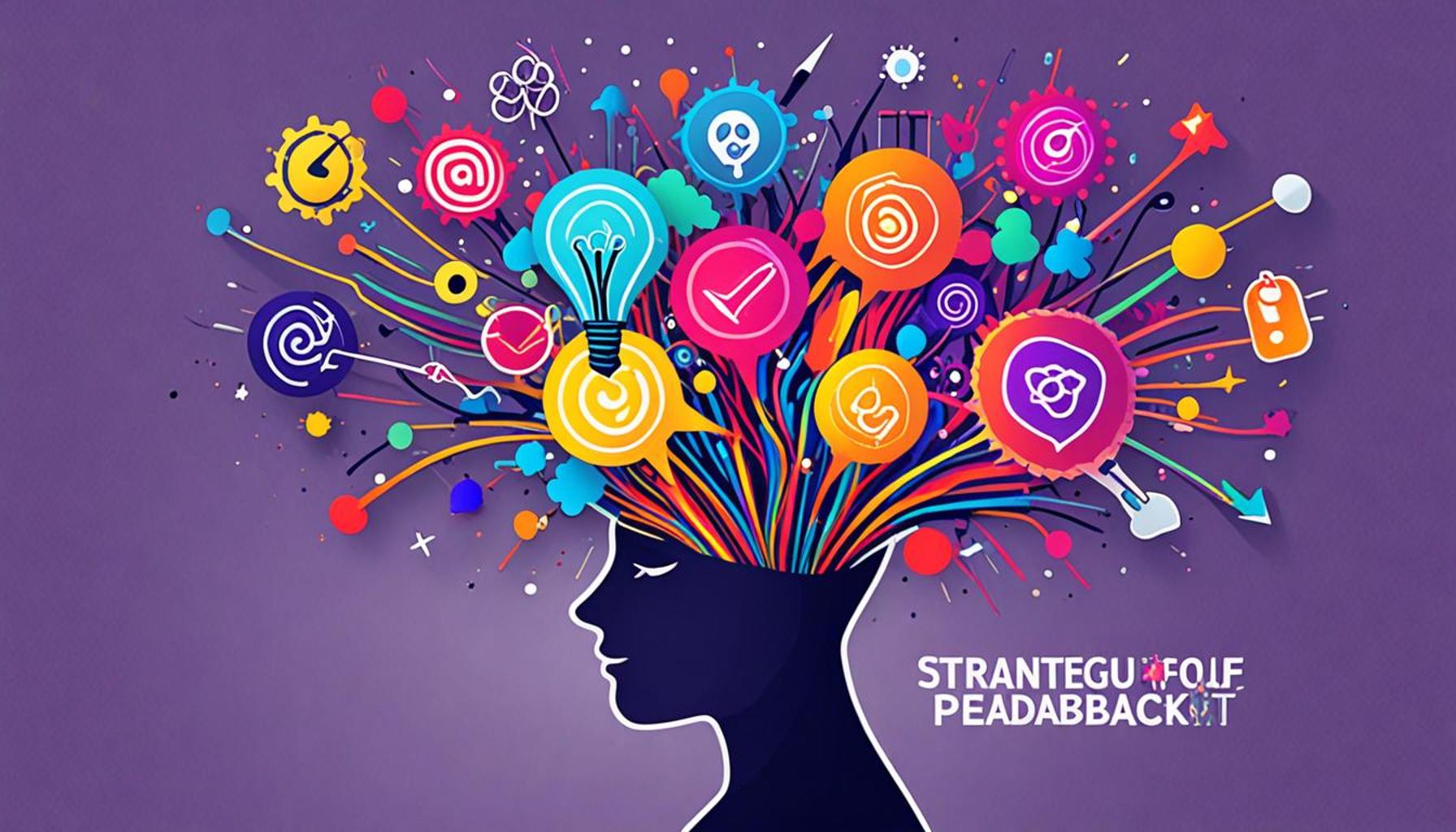Strategies for Integrating Continuous Feedback in Personal and Professional Development

Enhancing Personal and Professional Growth Together
In an age where adaptability is key, the role of continuous feedback has gained immense significance. The ability to embrace feedback constructively not only paves the way for improvement but also helps individuals navigate the complexities of everyday life, both personally and professionally. This practice creates an ecosystem of growth, where individuals are encouraged not only to seek input but also to act upon it, fostering a culture of learning and advancement.
One of the most compelling reasons to adopt continuous feedback is the improvement in performance. Regular input allows individuals to pinpoint their strengths and weaknesses with precision. For example, in a competitive corporate environment, managers who conduct frequent performance reviews help employees understand their growth areas. In Nigeria’s vibrant tech landscape, where startups flourish, developers can leverage feedback from peers to enhance their coding skills and build robust applications that meet market needs.
Another crucial factor is increased engagement. In a workplace setting, feedback facilitates open communication, transforming hierarchical structures into collaborative networks. This is particularly important in Nigeria, where many organizations still operate under traditional business hierarchies. By encouraging employees at all levels to participate in feedback loops, companies can foster innovation and inclusivity, driving greater job satisfaction and productivity.
Furthermore, the enhanced learning derived from continuous feedback prompts individuals to reflect on their experiences critically. Such reflection is essential in a country like Nigeria, where educational institutions are evolving to keep up with global standards. Students who receive timely feedback from teachers can adapt their learning strategies to achieve excellence in academics, thereby equipping themselves for future challenges.
Effective Strategies for Integrating Feedback
To effectively incorporate feedback into daily routines, several strategies can be employed:
- Regular Check-ins: Setting up frequent meetings to gather insights is fundamental. For instance, in Nigerian schools, teachers can conduct bi-weekly sessions with students to gauge their understanding of the syllabus.
- Utilizing Technology: Embracing digital tools for feedback, such as social media platforms or dedicated apps, can enhance the process. With the rise of mobile usage in Nigeria, platforms tailored to local needs can streamline feedback collection.
- Encouraging Peer Input: Creating an environment where team members can review and suggest improvements widens perspectives. Initiatives like peer-led workshops in Nigerian workplaces can yield significant contributions toward performance enhancement.
As you begin to explore these strategies, consider how continuous feedback can not only reshape your personal journey but also ignite a collective transformation within your community. By understanding and applying the power of feedback, you embark on a path that is not only fruitful for self-improvement but also beneficial for those around you.
CHECK OUT: Click here to explore more
Embracing Feedback for Continuous Improvement
The journey of personal and professional development in Nigeria is filled with rich experiences and opportunities for growth. However, integrating continuous feedback serves as a crucial pillar in this journey, allowing individuals to refine their skills and enhance their learning. The beauty of feedback lies in its capacity to propel individuals toward their goals, creating a transformative experience that not only aids personal growth but also cultivates excellence in broader professional settings.
A core element of effective feedback integration involves creating a feedback culture within any environment, whether it be corporate offices, educational institutions, or community groups. Establishing such a culture invites openness and transparency, leading to constructive exchanges that foster trust. In Nigeria, where cultural nuances often dictate communication styles, it is essential for leaders to model a feedback-rich atmosphere. Organizations that prioritize feedback tend to see significant shifts in performance, as employees feel valued and encouraged to express their opinions freely.
To fully harness the benefits of continuous feedback, individuals and organizations can implement several actionable strategies:
- Training Programs: Engaging in workshops focused on giving and receiving feedback effectively can equip participants with essential skills. For example, Nigerian businesses can host training sessions that emphasize the importance of constructive criticism, thereby demonstrating how to turn feedback into actionable insights.
- Establish Clear Goals: Establishing clear and measurable objectives allows feedback to focus on specific areas. In schools, teachers can work with students to outline clear milestones for academic achievement, making feedback relevant and targeted.
- Feedback Loops: Creating systems for ongoing feedback, such as anonymous surveys or suggestion boxes, can provide a platform for individuals to express their thoughts without hesitation. This approach is particularly effective in community organizations where diverse voices need to be heard.
As feedback becomes a part of the fabric of personal and professional growth, individuals begin to recognize patterns in their performance, which encourages proactive adaptation. In industries like healthcare or technology, where precision and innovation are paramount, the application of continuous feedback can lead to extraordinary results, including improved patient care and cutting-edge products. The continuous cycle of feedback and improvement not only leads to personal fulfillment but also positions organizations for competitive success in the dynamic Nigerian market.
Facilitating continuous feedback requires a commitment to change; however, the rewards of such a culture are immeasurable. As individuals explore these strategies, they not only elevate their own progress but also contribute to the collective advancement of their communities and industries.
Strategies for Integrating Continuous Feedback in Personal and Professional Development
In today’s fast-paced environment, continuous feedback plays a crucial role in shaping both personal and professional trajectories. This article delves into actionable strategies that individuals and organizations can adopt to ensure productive feedback loops, enhancing performance and enhancing growth.
| Category | Description |
|---|---|
| Frequent Check-Ins | Regular one-on-ones allow for immediate feedback and adjustments, fostering a culture of openness. |
| 360-Degree Feedback | This method provides insights from all directions—peers, supervisors, and subordinates—offering a comprehensive view of performance. |
| Feedback Training | Educating employees on giving and receiving feedback effectively builds confidence and skill. |
| Technology-Driven Feedback Tools | Utilizing software can streamline the feedback process, creating efficiency and accessibility for all parties involved. |
These strategies not only help integrate continuous feedback into the workplace but also promote a dynamic environment where everyone feels valued and empowered to grow. A culture of feedback leads to higher engagement and retention, showcasing a win-win for both employers and personnel. Exploring these methodologies further can unlock untapped potential, transforming how individuals and organizations approach personal and professional development.
RECOMMENDED: Check out this similar article
Navigating Challenges and Leveraging Technology
While the integration of continuous feedback is vital for personal and professional advancement, it is essential to recognize the challenges that may arise in the process. Acknowledging these obstacles and developing strategies to navigate them can make the feedback culture more effective and sustainable. In Nigeria, where traditional hierarchical structures often dominate workplaces, fostering open communication can be particularly challenging.
One significant hurdle is the fear of negative repercussions associated with giving or receiving feedback. Many individuals may shy away from providing constructive criticism due to concerns about relationships with colleagues or superiors. To combat this, organizations can promote a mindset that emphasizes the benefits of feedback over fear. This can be achieved through the implementation of peer review systems, in which employees are encouraged to provide and receive feedback in a structured format that highlights continuous improvement as a shared goal, rather than a personal attack.
Furthermore, leveraging technology can enhance communication around feedback. In an era where smartphones and internet access are ubiquitous in Nigeria, digital tools can provide seamless platforms for continuous feedback. Organizations can explore the use of collaboration software that includes feedback features, such as real-time comment sections or project management tools that allow team members to provide input on tasks easily. These platforms often encourage collaboration and can help normalize the feedback process, making it a daily part of the workflow rather than a daunting, sporadic event.
In educational settings, incorporating technology is equally critical. Teachers can utilize online portals where students can submit their work and receive timely feedback. This not only involves them in their learning journey but also prepares them for a modern workforce that increasingly relies on digital communication. The use of learning management systems, which provide instant feedback mechanisms, is gaining traction in schools across Nigeria, further supporting students’ academic growth.
- Mentorship Programs: Establishing mentorship programs can provide individuals with access to seasoned professionals who can offer valuable feedback based on their experiences. These relationships foster a culture where feedback is viewed as a gift, paving the way for greater learning opportunities.
- Regular Feedback Sessions: Scheduling regular one-on-one feedback meetings can help institutionalize the practice of continuous feedback. This can be particularly effective in industries like finance and education, where the dynamics of teamwork play a crucial role in achieving organizational goals.
Another innovative approach to nurturing a feedback-rich environment is the concept of 360-degree feedback. This method involves gathering feedback from multiple sources—managers, peers, and direct reports—providing a well-rounded perspective on an individual’s performance. This holistic approach can reveal blind spots and contribute significantly to personal and professional development, helping to shape future behaviors and decisions.
Ultimately, the journey towards integrating continuous feedback into personal and professional development is a multifaceted endeavor that requires adaptability and commitment. As organizations in Nigeria increasingly recognize the value of feedback, the potential for enhanced productivity and innovation becomes limitless.
LEARN MORE: This related article may interest you
Conclusion: Embracing a Culture of Continuous Feedback
As we explore the strategies for integrating continuous feedback into personal and professional development, it becomes clear that fostering an environment of open communication is not merely beneficial but essential for growth. By addressing challenges such as fear of negative repercussions and embracing technological advancements, individuals and organizations alike can create a culture that values feedback as a cornerstone of improvement.
The diverse approaches outlined—ranging from peer review systems to 360-degree feedback—offer innovative solutions tailored to the Nigerian context where traditional hierarchies often pose barriers. Implementing mentorship programs and regular feedback sessions not only allows for diverse perspectives but also strengthens relationships among colleagues, creating a supportive atmosphere for sharing insights.
Moreover, as technology becomes deeply ingrained in everyday life, leveraging digital tools can significantly streamline the feedback process. Utilizing collaboration software and online learning management systems can enhance real-time communication, making feedback an integral part of daily operations rather than isolated events.
Ultimately, the pursuit of a feedback-rich culture calls for a collective shift in mindset—one that views feedback as a gift rather than a critique. As Nigeria’s workplaces and educational institutions embrace these strategies, they pave the way for heightened productivity, innovation, and personal fulfillment. The journey may require persistence and adaptation, but the rewards of integrating continuous feedback into development processes are boundless, setting the stage for a brighter future.



